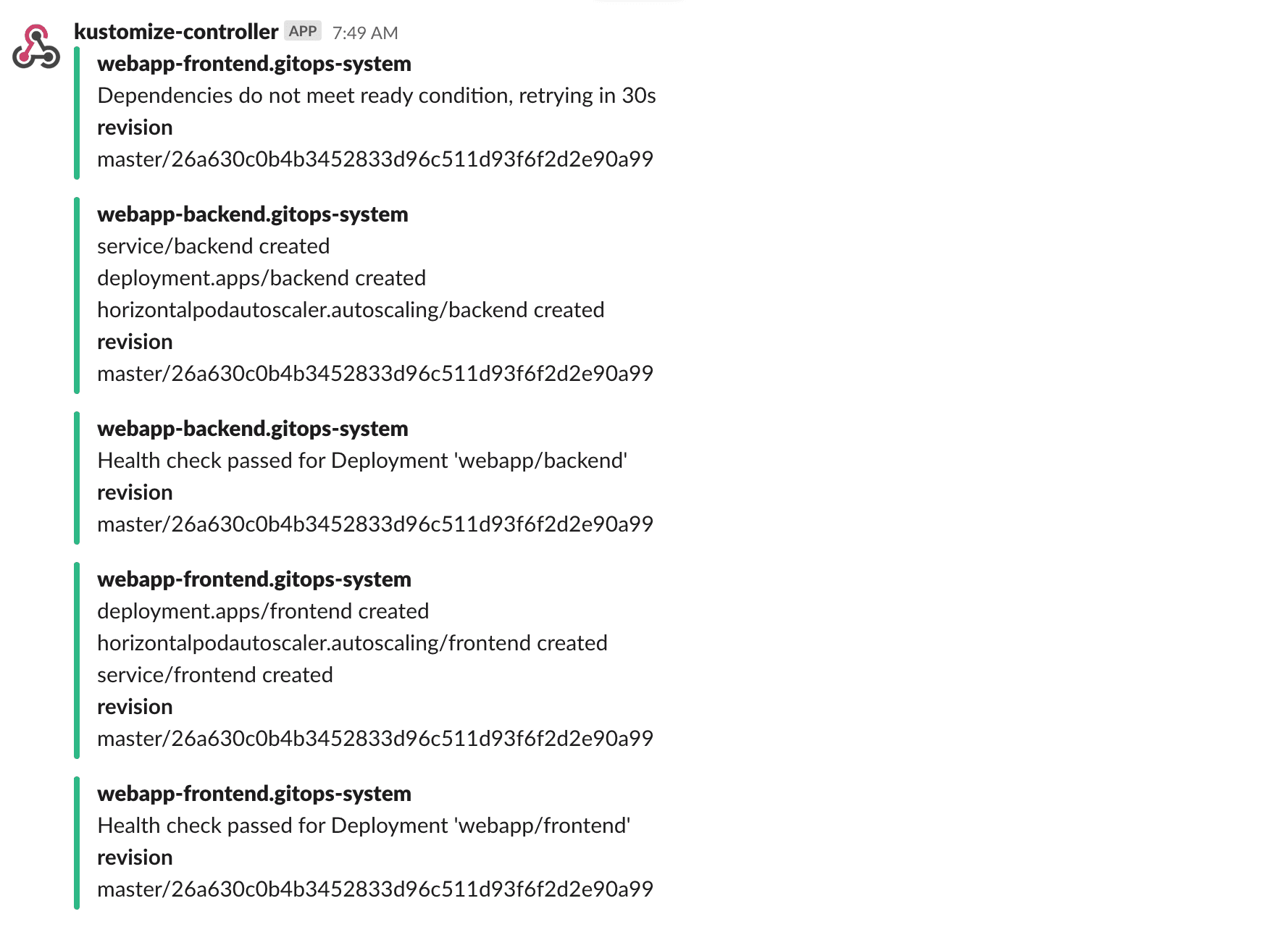5.0 KiB
Chat based notifications
When operating a cluster, you may wish to receive notifications about the clusters status in a messaging service.
For example, the status of a deployment, GitResource, or Kustomization.
This guide will walk you through how to setup Chat based notifications, for a variety of messaging providers.
Prerequisites
To follow this guide you'll need a Kubernetes cluster with the GitOps toolkit controllers installed on it. Please see the get started guide or the installation guide.
The GitOps toolkit controllers emit Kubernetes events whenever a resource status changes. You can use the notification-controller to forward these events to Slack, Microsoft Teams, Discord or Rocket chart. The notification controller is part of the default toolkit installation.
Define a provider
First create a secret with your incoming webhook:
kubectl -n flux-system create secret generic webhook-url \
--from-literal=address=https://webhooks.com/services/YOUR/WEBHOOK
Note that the secret must contain an address field,
it can be a Slack, Microsoft Teams, Discord, Google Chat or Rocket webhook URL.
Create a notification provider for your service by referencing the above secret:
=== "Slack"
bash $ flux create alert-provider slack \ --type slack \ --secret-ref webhook-url \ --channel general \ --export > slack-provider.yaml --- # slack-provider.yaml apiVersion: notification.toolkit.fluxcd.io/v1beta1 kind: Provider metadata: name: slack namespace: flux-system spec: type: slack channel: general secretRef: name: webhook-url
=== "Discord"
```bash
$ flux create alert-provider discord \
--type discord \
--secret-ref webhook-url \
--channel general \
--username flux \
--export > discord-provider.yaml
---
# discord-provider.yaml
apiVersion: notification.toolkit.fluxcd.io/v1beta1
kind: Provider
metadata:
name: discord
namespace: flux-system
spec:
channel: notifications-alerts-webhooks-example
secretRef:
name: webhook-url
type: discord
username: notifications-alerts-webhooks-example-bot
```
=== "Microsoft Teams"
bash $ flux create alert-provider teams \ --type msteams \ --secret-ref webhook-url \ --channel general \ --export > teams-provider.yaml --- # teams-provider.yaml apiVersion: notification.toolkit.fluxcd.io/v1beta1 kind: Provider metadata: name: teams namespace: flux-system spec: channel: general secretRef: name: webhook-url type: msteams --- === "Google Chat" bash
$ flux create alert-provider google-chat
--type googlechat \
--secret-ref webnook-url
--export > gchat-provider.yaml
---
# gchat-provider.yaml
apiVersion: notification.toolkit.fluxcd.io/v1beta1
kind: Provider
metadata:
name: google-chat
namespace: flux-system
spec:
secretRef:
name: webhook-url
type: googlechat
```
The provider type can be slack, discord, msteams, rocket, googlechat or generic
When type generic is specified, the notification controller will post the incoming
event in JSON format to the webhook address.
This way you can create custom handlers that can store the events in
Elasticsearch, CloudWatch, Stackdriver, etc.
Define an alert
Create an alert definition for all repositories and kustomizations:
flux create alert teams-alert \
--provider-ref teams \
--event-severity info \
--event-source Kustomization/'*' \
--event-source GitRepository/'*' \
--namespace flux-system
apiVersion: notification.toolkit.fluxcd.io/v1beta1
kind: Alert
metadata:
name: on-call-webapp
namespace: flux-system
spec:
providerRef:
name: slack
eventSeverity: info
eventSources:
- kind: GitRepository
name: '*'
- kind: Kustomization
name: '*'
Apply the above files or commit them to the fleet-infra repository.
To verify that the alert has been acknowledge by the notification controller do:
$ kubectl -n flux-system get alerts
NAME READY STATUS AGE
on-call-webapp True Initialized 1m
Multiple alerts can be used to send notifications to different channels or Slack organizations.
The event severity can be set to info or error.
When the severity is set to error, the kustomize controller will alert on any error encountered during the reconciliation process.
This includes kustomize build and validation errors, apply errors and health check failures.
When the verbosity is set to info, the controller will alert if:
- a Kubernetes object was created, updated or deleted
- heath checks are passing
- a dependency is delaying the execution
- an error occurs

